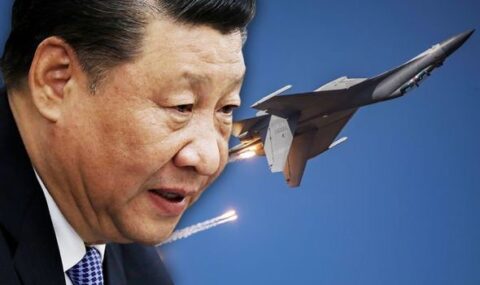The Chinese Communist Party celebrated the 100th anniversary of its founding this month by sending a record 149 military aircraft into Taiwan’s air defense zone.
Days later, during a speech commemorating the holiday, Chinese President Xi Jinping reiterated his vow to “utterly defeat” any attempts at Taiwanese independence and in a letter congratulating Eric Chu as head of the opposition party Kuomintang described the plight of the island nation as “complex and grim.”
Taiwan President Tsai Ing-wen, who was re-elected last year on promises to stand up to Beijing, responded to Xi’s braggadocio by reminding the world that Taiwan’s government has never “slacked off” or “advanced rashly” when threatened by the mainland. “I also want to repeat that we will never succumb to pressure,” she said.
Unfortunately for Taiwan the island will have little choice if China launches a full-fledged attack.
Given China’s military might and the completion of a massive heliport just 150 miles from Taiwan, Beijing could probably defeat the island in less than 15 hours – so what is Xi waiting for?
China’s failure to move against Taiwan (as it has vowed to do) may just be a matter of bad timing, explains Wall Street Journal contributor Walter Russell Mead.
Economic troubles, widespread blackouts, and the coronavirus pandemic have reflected poorly on a Communist regime that promised its people a better life. “To keep the economy running, China must stroke its neighbors rather than slap them. It is all very well to threaten and insult Australia, but when your power stations across the Chinese Rust Belt have run out of fuel, you need Australian coal to keep the lights on. From Beijing’s point of view, this would be a terrible time for a major Taiwan crisis,” writes Mead.
Complicating the situation further are factors including:
- President Biden’s September meeting with Quad nations
- A 6-nation joint naval exercise conducted in the Philippine Sea involving ships from the US, Britain, Japan, Canada, New Zealand, and the Netherlands
- Formation of the AUKUS partnership
- A French politician’s reference to Taiwan as “a country”
- Pro-Taiwan behavior in Japan’s defense agency
- Taiwan’s establishment of a diplomatic office in Lithuania
- Taiwan’s upcoming meeting with European leaders
“And so Mr. Xi seems to have decided, for now, on a two-track foreign policy,” adds Mead. “The showy intrusions into Taiwan’s air-defense identification zone and the tough talk in Mr. Xi’s July speech painted a picture of a strong leader standing against the world. But the goal is to rattle sabers without starting a fight, while Beijing waits for better times.”
Sources:
Xi Jinping’s Two-Track Foreign Policy
Taiwan says don’t get too close as China defends military drills
China-Taiwan tensions: We will not bow to Beijing pressure, says leader
